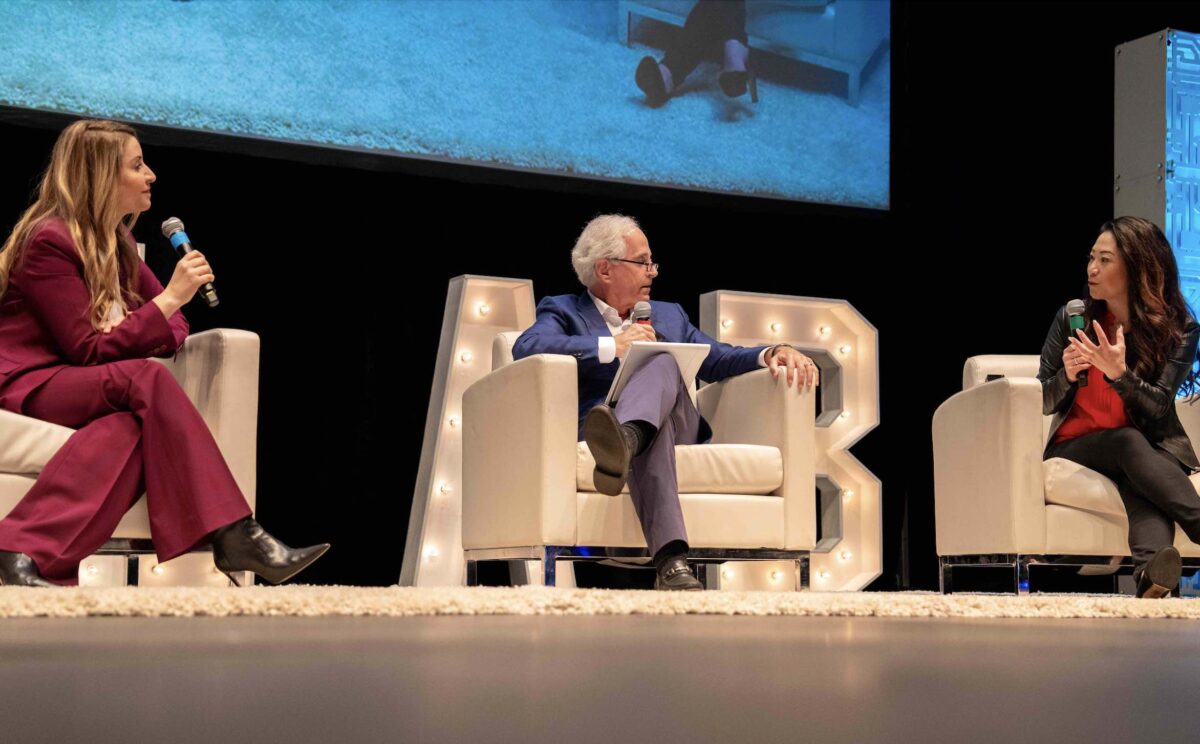- Quantum computing’s promise of advanced problem-solving remains largely unproven, but major tech companies continue to maintain divisions — and regions are competing to be leaders in the field.
- Universities play a significant role in quantum research, driving innovation and potential commercialization of new technologies. Some cities have more expertise than others.
- National defense considerations play into government interest and funding, with the US and China competing for technological leadership and the latter gaining an edge.
Early champions of new products and industries often have financial incentive for them to succeed. That presents a tricky cycle: Did they make a bet on quantum computing because they believe in the technology, or do they believe in the technology because they made the bet? Probably both.
So quantum enthusiasm is to be expected from leadership at IonQ, the Maryland-based, publicly-traded university spinout that’s betting its future on quantum computing coming fast. It’s one of several companies vying for authority in this still unproven advancement.
“How would you take your hardest problems and leverage quantum?” said IonQ chief marketing officer Margaret Arakawa back in May at a conference in Chattanooga, Tennessee. Standing on stage, she added to polite chuckles: Take out your credit card.
The economics of quantum computing
The quantum industry could certainly use more buyers. Whereas more than half of Americans have used generative AI in the last year, quantum computing remains obscure.
Investors poured in during the pandemic digital boom, but higher interest rates have hit the speculative quantum industry hard. It relies on esoteric physics that Einstein famously called “spooky action at a distance.” Why bet on complex science when US treasuries offer a fine return?
Most big tech companies and conglomerates think the opportunity is strong enough that they maintain quantum divisions – including IBM, Intel, Google and Microsoft. Honeywell made a $300 million investment this year in a 2021-merged company called Quantinuum. But it’s the standalone, publicly-traded quantum companies that best illustrate the treacherous fall from the frothy pandemic years. At its peak in November 2021, a share in IonQ was selling at nearly $30; today it’s below $8.
Canadian-based D-Wave Quantum and French firm Atos have performed similarly badly. Atos is indebted enough that the French government is rumored to be considering buying what it deems to be the company’s strategically important assets.
Quantum is not one technology.Jonathan Felbinger Quantum Economic Development Consortium
To understand the industry’s importance, it helps to know the basics. Quantum computing relies on mind-bending quantum mechanics to process information differently than classical computers. Quantum bits, or qubits, can exist in multiple states simultaneously, which allows far greater processing power for certain calculations. In 1994, mathematician Peter Shor published a landmark paper identifying how a theoretical quantum computer could defang internet security — passwords be damned. Dreams of transforming drug discovery and gene manipulation followed, with hints of advances in an array of fields.
That inspired a quantum-focused university research boom.
Founded in 2012, the Pittsburgh Quantum Institute spans research fields and institutions, including prestigious Carnegie Mellon University, which unveiled last fall its own new quantum research center. That center is backed by the National Science Foundation and promises to engage government, academia and industry. Johns Hopkins University and the University of Delaware also boast quantum-focused departments that converge science and commerce.
The University of Pennsylvania last year launched its Center for Quantum Information, Engineering, Science and Technology (QUIEST, pronounced “kwee-est.”), calling it a “transdisciplinary” field spanning physics, materials science and information science.
“Quantum is not one technology,” Jonathan Felbinger, deputy director of the DC-based Quantum Economic Development Consortium, recently told me.
After decades of promise, Felbinger and other industry advocates want quantum research to make its way into practical use. Commercializing research can also be a reputational and financial win for universities.
IonQ is a victory, but an imperfect one for the University of Maryland, where company cofounder Christopher Monroe developed key intellectual property. Back in 2021, he left for Duke University, where his cofounder Jungsang Kim is tenured. Both have since left their full-time roles at IonQ and returned to academia – which speaks to quantum’s reliance on university research.
CEO Peter Chapman last fall boasted to Bloomberg: “We have a relationship with Duke University, where the work that they do there, funded by the government, is exclusively licensed and royalty-free to [IonQ].”
The case for national defense
Coursing through the industry is a rallying cry of “national defense.”
Enthusiasts imagine a reliable and effective quantum computer that could surpass any rival’s cybersecurity strategies, per Shor’s paper 30 years ago, and accelerate other critical discoveries. The claim may be true. It’s also good business.
“The best customer in the world is the federal government,” one industry critic told me earlier this year. “And the best way to keep the federal government as a customer is to scare the living shit out of it.”
No question policymakers and federal officials are paying attention — DARPA is funding quantum experiments and a Congressional subcommittee recently called for a military-focused quantum computing lab. Last fall, IonQ announced a $25 million contract with the US Air Force Research Lab to construct two quantum computers. (Though comparisons are difficult because of various architectures, by one count, there are fewer than 150 quantum computers in the world, with almost half operated by IBM.)
After that conference-stage quantum boost from IonQ CMO Arakawa back in May, she was joined on-stage by her Chief Revenue Officer Rima Alameddine, and Tennessee’s former US Sen. Bob Corker, also a former Chattanooga mayor.
Flanked on either side by the IonQ execs, Corker played the role of civic booster: “We want a quantum computer in Chattanooga.”
He and other economic development leaders are attracted to quantum for its promise as a potential longterm jobs creator. Others view it centrally as necessary to stay ahead of the competition. Quantum, like AI, semiconductors and other advanced technologies, is the fiercest battleground in the growing cold war between the US and Chinese governments.
At a quantum-focused session at that Chattanooga conference, a staffer for US Rep. Marsha Blackburn put it plainly: “We see China as the greatest existential threat in many ways.” The attitude risks a separation between two great scientific powers.
As of 2021,OECD research shows more Chinese scientists are returning to China than coming to the United States, and quantum computing is a focus. Last year, researchers in China set the current record for the number of quantum bits entangled in a quantum computer, which predicts higher performance. Chinese researchers now far outpace American, Japanese and European counterparts in producing high-impact, quantum-related academic papers.
Note: This trend is also true for AI. According to talent tracker MacroPolo, in 2019, a third (34%) of Chinese students focused on AI stayed in the county; by 2022, it was nearing two-thirds (58%).

Where quantum computing will develop
Few standards are yet set in quantum computing because so little is proven about its commercial viability.
IonQ operates so-called “trapped ion” quantum computers, whereas Google’s AI division is focused on superconducting qubits. These and other distinctions are being worked out in university research facilities and company labs around the world.
To fund their work, many quantum companies are commercializing “near-term quantum applications” and “quantum inspired” tools using classical computers.
IonQ CMO Arakawa said 90% of a new platform’s value is captured by the first 10% of industry pioneers. After a generation of boom and bust cycles, Arakawa predicts an uninterrupted rise for quantum: “No winter is coming.”
As another industry booster told me: “We know the physics, we are working on the engineering.”
Others are betting now is the time. The recently finalized US Economic Development Administration’s Tech Hubs program is putting $41 million toward quantum computing-focused clusters in Colorado and New Mexico.
That’s not the only US region vying for leadership in the field. IonQ’s headquarters are in College Park, Maryland. 90 minutes away is a satellite office of the Honeywell-backed Quantinuum, in Virginia satellite tech hub Arlington, near DARPA and the Department of Defense. All that gives the DMV a credible claim on being a quantum leader.
Chattanooga boosters including Corker, the former senator, want a quantum reputation. That city has the fastest internet in the country, engaged industry leaders like Volkswagen, affordable energy operated by the Tennessee Valley Authority and its own small, if mighty, quantum higher ed footprint at the University of Tennessee-Chattanooga. Already Chattanooga boasts what it calls "the nation’s first commercially available quantum network," operated by its Electric Power Board and Silicon Valley quantum startup Qubitekk. The city is also less than two hours from healthcare-leading Nashville and Oak Ridge National Laboratory, which has a quantum division.
How much will all this speculation result in real change soon? The trouble with advanced technologies is that for the same reason we can’t imagine all their applications, we also can’t imagine all the implications — and obstacles to getting there.
“It’s a race for a distributed and networked quantum computer,” said IonQ CRO Alameddine. Most quantum computers are primarily experimental but coherence is growing, and IonQ leadership made an on-stage pitch for a collaboration between Chattanooga, Oak Ridge and Nashville: “You have the capabilities to do that.”
Given the very physical nature of quantum, there’s hunger to be a leader. It’s fitting that to have a global impact, quantum needs to get the very smallest bits right. As the IonQ CMO Arakawa put it: “Solve local first.”
In the early days of the consumer internet, she said, companies identified the easiest processes to test online, what was called “lift and shift.”
“But quantum is different,” Arakawa said. “Take your hardest problems, find a small use case and power through.”
For quantum boosters, their biggest problem might be funding wider adoption.
Updated 12:25 p.m. to clarify photo credits from the conference and that the EDA Tech Hubs award for quantum computing is going to efforts in Colorado and New Mexico.







